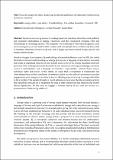Files in this item
Towards energy care ethics : exploring ethical implications of relationality within energy systems in transition
Item metadata
| dc.contributor.author | Damgaard, Caroline Sejer | |
| dc.contributor.author | McCauley, Darren | |
| dc.contributor.author | Reid, Louise | |
| dc.date.accessioned | 2022-11-26T00:41:15Z | |
| dc.date.available | 2022-11-26T00:41:15Z | |
| dc.date.issued | 2022-02 | |
| dc.identifier | 277340777 | |
| dc.identifier | 718a20b9-e6d3-4d08-bfd0-8359b40ad923 | |
| dc.identifier | 85119926318 | |
| dc.identifier | 000744239500003 | |
| dc.identifier.citation | Damgaard , C S , McCauley , D & Reid , L 2022 , ' Towards energy care ethics : exploring ethical implications of relationality within energy systems in transition ' , Energy Research and Social Science , vol. 84 , 102356 . https://doi.org/10.1016/j.erss.2021.102356 | en |
| dc.identifier.issn | 2214-6296 | |
| dc.identifier.other | ORCID: /0000-0003-0577-1210/work/105956678 | |
| dc.identifier.uri | https://hdl.handle.net/10023/26501 | |
| dc.description.abstract | Social science energy research is asking important questions about the social, political, and economic implications of energy transitions, and the consequent changing roles and relationships in the energy system. This has given rise to ethically driven research agendas, with an increasing focus on the need to better understand how people relate in their daily lives, both to mundane dilemmas around energy use, and to bigger questions around energy systems and energy system change. Based on insights from empirical Q-methodological research in Denmark and the UK, this article illustrates relational understandings of energy systems and a language of dependence, necessity and needs as important elements in how people make sense of the energy transition and their place in it. This challenges dominant frameworks and discourses of energy and energy transitions rooted in individualism and a language of individual responsibility, rational choice and/or individual rights and justice. In this article, we argue that a recognition of relationality and (inter)dependence as basic conditions of existence, and as basis for ethical reasoning in everyday engagements with energy in transition, is key to reflecting ways of relating to energy ethicalities in the everyday. This speaks strongly to recent advances of relational theories of energy systems and transitions, but calls for a recognition not only of inter-connections and relations, but of their ethical significance. To this end, we engage a feminist theory of care and care ethics in a proposition to ‘think energy with care’. | |
| dc.format.extent | 476270 | |
| dc.language.iso | eng | |
| dc.relation.ispartof | Energy Research and Social Science | en |
| dc.rights | Copyright © 2021 Elsevier Ltd. All rights reserved. This work has been made available online in accordance with publisher policies or with permission. Permission for further reuse of this content should be sought from the publisher or the rights holder. This is the author created accepted manuscript following peer review and may differ slightly from the final published version. The final published version of this work is available at https://doi.org/10.1016/j.erss.2021.102356 | en |
| dc.subject | Care ethics | en |
| dc.subject | Denmark | en |
| dc.subject | Energy ethics | en |
| dc.subject | Low-carbon transition | en |
| dc.subject | Q-methodology | en |
| dc.subject | UK | en |
| dc.subject | G Geography (General) | en |
| dc.subject | Renewable Energy, Sustainability and the Environment | en |
| dc.subject | Nuclear Energy and Engineering | en |
| dc.subject | Fuel Technology | en |
| dc.subject | Energy Engineering and Power Technology | en |
| dc.subject | I-PW | en |
| dc.subject | SDG 7 - Affordable and Clean Energy | en |
| dc.subject | AC | en |
| dc.subject.lcc | G1 | en |
| dc.title | Towards energy care ethics : exploring ethical implications of relationality within energy systems in transition | en |
| dc.type | Journal article | en |
| dc.contributor.institution | University of St Andrews.School of Geography & Sustainable Development | en |
| dc.contributor.institution | University of St Andrews.Centre for Energy Ethics | en |
| dc.contributor.institution | University of St Andrews.Geographies of Sustainability, Society, Inequalities and Possibilities | en |
| dc.identifier.doi | 10.1016/j.erss.2021.102356 | |
| dc.description.status | Peer reviewed | en |
| dc.date.embargoedUntil | 2022-11-26 |
This item appears in the following Collection(s)
Items in the St Andrews Research Repository are protected by copyright, with all rights reserved, unless otherwise indicated.

